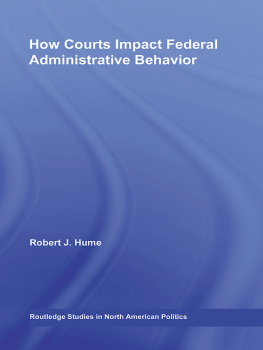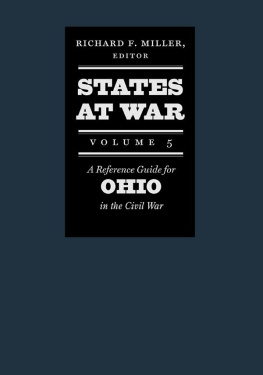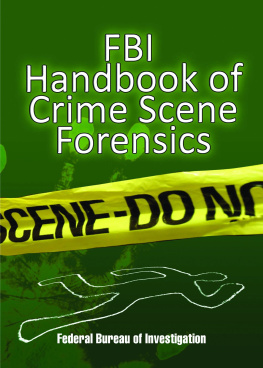1991 The University of North Carolina Press
All rights reserved
Manufactured in the United States of America
The paper in this book meets the guidelines for permanence and durability of the Committee on Production Guidelines for Book Longevity of the Council on Library Resources.
95 94 93 92 91 5 4 3 2 1
Library of Congress Cataloging-in-Publication Data
Miller, Wilbur R., 1944-
Revenuers and moonshiners : enforcing federal liquor law in the mountain South, 18651900 / by Wilbur R. Miller,
p. cm.
Including bibliographical references and index.
ISBN 0-8078-1959-x (alk. paper). isbn 0-8078-4330-x (pbk.: alk. paper)
1. Distilling, IllicitAppalachian RegionHistory19th century. 2. Liquor lawsAppalachian RegionHistory19th century. 3. Southern StatesHistory1865-1951. I. Title.
HJ5021. M55 1991
364.133dc20
90-49549
CIP
Some material in this book was previously published in The Revenue: Federal Law Enforcement and Popular Resistance in the Mountain South, 1865-1900, Journal of Southern History 55 (May 1989): 196-216. Copyright 1989 by the Southern Historical Association. Reprinted by permission of the managing editor.
THIS BOOK WAS DIGITALLY MANUFACTURED.
Preface
This book began as something else, a study of federal civil rights law enforcement during the Reconstruction era of the 1870s. My previous work on urban policing and several years of teaching a course on the Civil War and Reconstruction led me to see Reconstruction as a novel federal policing effort in the face of determined southern resistance. Part of the explanation for its failure could be found in difficulties and dilemmas of balancing force and restraint experienced by ordinary policemen. Research in this area, though, soon convinced me that many other scholars have covered this ground and that I would add only a slight twist to familiar interpretations.
The apparent dead end led to this book. Amid the mountain of archival material on enforcement of Reconstruction civil rights and election laws were many references to internal revenue and moonshiners. In fact, most of the correspondence of several southern federal district attorneys was concerned with difficulties in collecting the whiskey tax and dealing with violent resistance. I had serendipitously found a new topic, one that not only addresses the police problem of federal authority in an area that has been scarcely explored, but adds a new element to historians ongoing debates about whether the Civil War left a legacy of permanently expanded federal power.
In addition, the study of revenue enforcement offered a chance to compare it to Reconstruction, since many of the same officials were engaged in both tasks, though usually in different regions of their states. Contrasting the failure of Reconstruction with the relative success of revenue enforcement contributes to understanding a central question: What are the conditions under which unpopular laws can be enforced, and what are the limits of their enforcement? Policies and practices of government officials, political calculations and needs, and the nature of the people resisting authority all entered the picture.
The confrontation between revenuers and moonshiners who refused to pay the federal excise tax on their home-distilled whiskey was localized, mostly confined to the southern Appalachians. Local people, though, were challenging a fundamental aspect of national authority, the ability of the government to collect its taxes. A regional confrontation became a national issue, and its history is part of the nations history.
This study is more about revenuers than moonshiners, adding to knowledge of federal policing, the nature of national authority, and the growth of a bureaucratic state in the late nineteenth century. Consequently, moonshining and its practitioners are seen from the perspective of the revenuers. I am not trying to make heroes of the revenuers, for it will be clear that there were corrupt and brutal men among them as well as some who were honest and brave. The ordinary revenuer had a job to do and usually tried to do it to the best of his ability.
Since this is an account of the interaction between federal officials and moonshiners, something about the moonshiners themselves and the southern Appalachian society in which they lived must be part of the story. Moonshiners have been traditional heroes, representatives of a stubborn individualism that appeals to Americans resentment of government interference in their lives. Moonshiners have also been presented as simple country folk, victims of outside forces beyond their understanding or control. I have not sought to debunk or support either image but, in general, have come to understand moonshiners as men, and sometimes women, going about their business for a variety of reasons or motives. This discussion begins with , and general readers may wish to begin there, since the first chapter addresses issues mostly of interest to specialists in late-nineteenth-century institutional history.
In describing mountain society, I have been able to rely primarily on the work of a group of historians, notably Ronald Eller, Gordon McKinney, Altina Waller, Durwood Dunn, and others acknowledged in my notes, who during the last ten or fifteen years reshaped our understanding of Appalachia. Reading their books, and the responses of McKinney, Waller, and an anonymous manuscript reader to my work, has enabled me to understand the moonshiner quite differently from the old, very widely disseminated image of the backward, quaint, squirrel-rifle-and-whiskey-jug-toting hillbilly. He and sometimes she were part of a changing society, a product of both the traditional aspects of mountain culture and the forces of industrialization that were reshaping Appalachian society after the Civil War. Revenuers were but one of the novelties many mountain people faced.
Thanks are due to Harold Hyman, who has followed this project as it took shape over the years and offered both encouragement and caution against trying to carry my arguments too far. If I am insufficiently cautious here, of course I cannot say that I did not have warning. William F. Holmes, the first academic historian to pay attention to moonshiners, also deserves thanks here for support in the early stages of this study.
Thanks to my wife, Carole Turbin, belong here rather than the usual place at the end. In the midst of writing her own book, she helped me figure out what mine was really about and contributed to formulating its argument. Her confidence was essential in seeing a very long and drawn-out project to its completion.
In addition to these intellectual debts is the practical help every researcher receives from archivists and librarians. I wish to thank especially Cynthia Fox and William Sherman, who seemed to take a personal interest in my hunt through Department of Justice and Bureau of Internal Revenue records in the National Archives. Likewise, Mary Ann Hawkins and Charles Reeves of the Atlanta Branch of the National Archives cheerfully helped in my efforts to mine at least the surface of their rich collection of federal court records. The staffs of the Southern Historical Collection and North Carolina Collection at the University of North Carolina at Chapel Hill were always courteous and efficient, as were those at the West Virginia University Library and the University of Georgia Library. Although my work there was more routine and less personal, the New York Public, Columbia University, New York University, and the SUNY Stony Brook libraries proved to be especially useful as well as convenient.







